Don’t Touch That Mail!
A native Nigerian writer takes stock of the changing face of her country's most prominent economic export after oil: e-mail scams.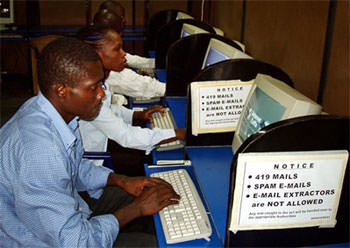
A native Nigerian writer takes stock of the changing face of her country’s most prominent economic export after oil: e-mail scams.
Like most of us, you may be looking for some extra money. What with an unpaid mortgage, credit card debts, sundry bills and day-to-day expenses, a little extra cash would not be a bad idea. An e-mail like the one below may seem to be just what you need to turn your fortunes around. And turn around they may — directly into the pockets of a Nigerian scammer.
ATTN: BENEFICIARY/NEXT OF KIN FIRST QUARTER PAYMENT NOTIFICATION ADVICE (2007)
In our response to instruction from the Federal Government of Nigeria to release and pay all foreign contract funds to their beneficiaries, I the Governor of the Central Bank of Nigeria on this day issued the release of your forty two million United States dollars ($42,000,000.00) contract payment by classified bank draft. This is because the Federal Government of Nigeria has directed that all foreign payments at this time that involve huge sums of money should be paid by classified bank draft as a measure to check terrorist account operation and to be able to monitor every payment. In line with this development, I have therefore signed your payment draft. A draft payment covering your ($42,000,000.00) contract sum has been raised in your favor to be drawn from Central Bank of Nigeria offshore account in America and Europe. As a matter of urgency, you are hereby advised to contact Dr. Mrs. Joy Oge of the International Remittance Department of the Central Bank of Nigeria for the mailing of your draft. Contact her via email: [E-mail address deleted in this article]
This and similar e-mails are variations of what has come to be known internationally as the Nigerian scam or Nigerian 419, a type of fraud that originated in Nigeria in the 1980s. It takes its name from Section 419 of the Criminal Code of Nigeria, which relates to fraud and cybercrime.
You may think you are too smart to be scammed. Well, John Worley had a practice as a Christian psychotherapist in Massachusetts when he received an e-mail from someone seeking his assistance to transfer 55 million American dollars out of South Africa to the United States “for onward dispatch and investment.” The writer of the e-mail purportedly had been the chief of security to the late Congolese President Laurent Kabila. His story was that he was on a mission to buy weapons for a force of elite bodyguards for Kabila when the president was assassinated. The money, more or less, became his, and he needed a partner with an overseas account to help in the movement of the money to the United States for a rich reward.
Hale, hearty and in perfect control of his senses, Worley, who had previously developed a psychological profiling tool designed to reveal a person’s “unique needs, desires and probable behavioral responses,” bought this cock-and-bull story for some strange reason and became the “overseas partner.” Worley was taken through twists and turns of lies, intrigue, false documents, bad checks and fake money orders until things fell apart. He used every penny he had or could borrow to fulfill his part of the deal. But there was really no deal. Whatever deal existed was in Worley’s imagination.
Despite a personal loss of close to $80,000, Worley got a two-year prison sentence for bank fraud, money laundering and possession of counterfeit checks. This is in addition to having to pay restitution of nearly $600,000 to several banks for the bad checks his “business partners” induced him to cash before wiring money to an account in a Swiss bank. (For the full story, see the article in The New Yorker)
Rupert Sessions, a retired Ormond Beach, Fla., electronics specialist, fared no better. He went all the way to the Persian Gulf — two trips actually, all in a bid to help in moving millions of dollars from a bank in Togo to the United States for a cut. What he got in return was an unkind cut. As the Orlando Sentinel put it: “He sold stock, got a second mortgage and hocked two of his cars. For more than a year, he gave virtual strangers every dollar he had. He bought them gold pens, cell phones and a laptop computer” — losing $320,000 in all. Wait a minute; he did get something: a gift of a carved wooden elephant and antelope from his “business associates.”
Shahla Ghasemi, a nurse, and her husband, Dr. Ali-Reza Ghasemi, both American citizens of Tampa, Fla., lost about $400,000 in personal and borrowed funds. A foreign contractor from their native country who had died was said to have transferred a fortune to one Dr. Ali Reza Ghasemi. The names were the same, so the fortune had to be claimed! The Ghasemis bought the story and were scammed within an inch of their lives.
In Woodbury, N.J., the municipality’s former director of economic development, Stanley El, lost nearly $5,000 of his own money and ended up being involved in a scam to defraud Fleet Bank of nearly $50,000 in a bid to help one Prince Jide Lawal Ige, who claimed to be the son of a Nigerian chief who had been assassinated. “Prince Ige” needed to retrieve more than $30 million in cash so he could rescue his mother and sisters, who were stranded in Nigeria and in danger of going the way of his father. He had barely managed to escape to Spain with his own life intact.
If you think you are un-scammable, consider this: An unnamed Scotland Yard detective lost 5,000 pounds in a scam promising him millions. Yes, a Scotland Yard detective! He was saved from handing over 25,000 additional pounds by police colleagues who were investigating the con. He had been told by a Nigerian fraud gang he would get a share of 7 million pounds in gold bullion that would be freed by customs once fees had been paid. The gold, of course, was nonexistent.
Maybe you wonder how someone you do not know would send you an e-mail. “Someone must really have given him/her my e-mail address,” you might imagine. Wrong. Spammers harvest e-mail addresses found on websites. Others run programs that query mail servers. Spammers also sell each other CDs with millions of addresses. That is why you receive all that unsolicited commercial e-mail. Lists of e-mail addresses are sold and bought everyday on the Internet. Many companies that have asked for your e-mail may sell your address to people who turn out to be scammers, or they have employees who secretly and intentionally sell to scammers.
The 419 Coalition, a body devoted to fighting Nigerian Internet scams, describes that country as “the undisputed headquarters of scam” and gives “Five Rules for Doing Business With Nigeria”: NEVER pay anything upfront for ANY reason. NEVER extend credit for ANY reason. NEVER do ANYTHING until their check clears. NEVER expect ANY help from the Nigerian government. NEVER rely on YOUR government to bail you out.
This is a sad state of affairs for the most populous country in Africa. (One in every four Africans is a Nigerian.) Nigeria is the fifth-largest producer/exporter of oil in the world, has 91 mineral products and 36 percent arable land and is the largest domestic market in Africa. Despite its endowments and potentials, Nigeria is among the poorest nations of the world and is the “whipping boy” of the Paris Club of Creditor Nations, because only the daring do business with Nigeria. As a result of stereotyping, honest and hardworking Nigerians end up demonized and stigmatized by the rest of the world because of the sins of their criminally minded compatriots.
After years of slumber and ineptitude, the Nigerian government established the Economic and Financial Crimes Commission to battle the menace of cybercrime. Mallam Nuhu Ribadu, the commission’s executive chairman, said: “Our economy has lost hundreds of millions of dollars in foreign investment because our credibility and the trust of the international community have been affected. Nigerians can’t even use financial instruments as basic as mail orders. If it comes from Nigeria, it is suspect.”
The scammers, or “Yahoo guys” — so named because most of their addresses end in @yahoo.com or @yahoo.co.uk — may pose as officials of the Nigerian commission. They contact earlier 419 victims, posing as investigators probing the fraud and pretending to be helping the victim to get back lost money.
I am Mallam Nuhu Ribadu, chairman of the Nigerian Economic and Financial Crimes Commission. It has come to my notice that some Nigerians defrauded you to the tune of $800,000.00 a few years back. I have your file on my table right now and wish to inform you that the persons who defrauded you have been apprehended. They have confessed and handed your money over to the commission. I therefore wish to forward this money to you….
With this, you are in for another round of “Nigerian roulette.” Once they secure your confidence, they start asking for the usual things — processing fee, handling charges, legal/documentation charges etc.
The Yahoo-guy criminals are quite creative. No one can claim to have an exhaustive list of their tricks.
An American soldier may need your help to move 10 boxes of gold and diamonds belonging to Saddam Hussein out of Iraq to a safe place where you can both enjoy the loot.
Your e-mail address, attached to ticket number 694/213/7560/621 with serial number 886/07, may have drawn the lucky number 016/0545/3317 and won for you 1 million British pounds in a lottery organized by “Micro Soft Corporation” for loyal Internet users.
An art/antiques dealer may need you to be his representative in Europe and America. A dealer in African haute couture may want you to be his/her representative in America.
The son of a white Zimbabwean farmer who was murdered by Mugabe’s hit squad may need your help to get his father’s money out of Zimbabwe.
A wealthy South African HIV-positive couple may wish to leave their children in your care after they pass on.
Your mail may originate from an African country other than Nigeria or from Europe or even the United States. But it is the same scam. Yahoo guys have broad-spectrum connections. They have collaborators of all races. They may also use space aliens and flying saucers for effect. Voodoo, witchcraft, black magic, curses, hexes and spells may be used to suck in those who have a taste for the exotic.
And when Yahoo guys decide to be really mean, they invite you to come to view your “investment” in Nigeria, South Africa or somewhere in Europe. This often happens when the mugu or maga (the person being scammed) is trying to be smart or inquisitive. Going on such a trip is like going into extreme sports. The next turn could be a last lap. One such visiting “business partner” was found with a knife in his heart in a Lagos hotel some years back.
If a scammer persists in trying to ensnare you, snail-mail whatever scam documents s/he sends to the United States Secret Service, Financial Crimes Division, 419 Task Force, 950 H Street, Washington, D.C. 20001-4518, USA. Mark the documents “No Financial Loss — For Your Database.” Or, you may e-mail the task force at [email protected].
You may also write the e-mail provider of a potential scammer and include the 419 message with its headers. Complain about the 419 message and ask that the account be shut down.
Among the forms of the Nigerian scam is the over-invoiced or double-invoiced oil, health, defense, peacekeeping or other supply and service contract: The Nigerian government overpaid on some contract, and we need a front man to get it out of the country before authorities discover the error.
Apart from protecting your financial self-interest, there is an ethical question here. Should you really be helping this fellow to defraud his government? This is clearly an under-the-table deal — and you would have to crawl to get under the table. Nice people don’t crawl.
A bequest may be left you in a will by some long-lost relative whose lawyer is a Nigerian or by a wealthy childless Nigerian who is on his deathbed and wants to punish his greedy relatives by leaving all his money to a stranger or to your church. As usual, you pay processing fees, documentation fees, handling charges. You may even have to chip in toward the burial expenses or memorial rites. It goes on until the scales fall off your eyes.
For the bizarre, try the money-cleaning scam: Someone has a lot of currency that needs to be “chemically cleaned” before it can be used. He needs to share the cost of the chemicals with you so that you get a percentage of the money when it is cleaned. The story here is that the money was smeared with black grease to escape detection by customs X-rays and this grease needs to be cleaned off with chemicals that are very expensive.
And for the absurd, the spoof bank scam is unbeatable. Here, there is supposedly money in your name or a name that looks like yours already on deposit in some bank and you have to pay fees to regularize the transaction. You may also be asked to pay some money into the account as proof of your commitment to the deal. Call it “counterpart funding.”
The secret shopper variation offers some melodrama. Someone orders items on trading and auction sites on the Web and pays with fake money orders or checks.
It is my earnest interest to write you. My clients saw your address on the Internet. They have also visited your website and found your products good to them. My company is a consultant in America here. My clients are interested in your products and they are situated in Nigeria. They are interested in buying your products. I will be very glad if you will respond to my request as soon as possible to enable us start a good business relationship and also the payment option of my company is through credit card (not Pay pal) and my shipping method is via United Parcel Service (UPS) or FedEx express. Looking forward to receiving from you soon.
At the end of the line, you will be paid for the purchase with a check in excess of the amount required for some reason that appears genuine at first. Your “client” will ask you to forward the overpayment to a third party via a cashier’s check or money order. Your bank will later inform you that you were paid with a bad check. You will then have to pay back whatever you took from the bank in addition to the goods you have now lost. All efforts to contact your “business partner” will be unsuccessful.
The chat room and romance variation is the most interesting. It is usually combined with one of the other forms of 419. You meet someone in a chat room and fall head over heels in love. (Do such things really happen?) The object of your affection secures your confidence one way or the other. S/he then begins to play on your emotions, making what look like harmless requests at first (small change, camera, mobile phone etc.). But as the plot thickens, you begin to part with more valuable things.
An offer of marriage is made to further suck you in. Undying love is declared on both sides. You need to send engagement rings and money for a traditional betrothal ceremony at this point. You also need to send gifts to an extended family of in-laws. The “love of your life” is a poor, cash-strapped African, and you need to give financial muscle to the relationship. You need to pay the bride price. You may even be asked to pay for a virginity test, or, if the distant loved one is male, for a manhood test. There will also be a wine-carrying ceremony. There will be sacrifices to appease the ancestors for the sacrilege of a “prince/princess” marrying a stranger. Before you know it, you have invested heavily in what should have been a simple matter of the heart. One of the easiest hoaxes to fall into is the employment scam. Someone advertises what looks like a lucrative job offer on the Internet. It may be at a Kuwaiti oil field, a South African gold mine or a Sierra-Leonean diamond mine. Yummy! You apply and pay a processing fee. You are selected for what looks like the opportunity of a lifetime. Soon you have to pay passport verification fees, visa fees and handling charges, etc. Some brazen ones will arrange for you to meet a “local representative.” You think this has got to be real and you start packing your bags. Then … nothing.
Here’s another example of a scam that involves a purported business relationship:
The Nigerian National Petroleum Company has discovered oil, and as government employees, we want to acquire the land, but we need a front man to purchase it for us. We will then partner with you to drill the oil. A tourist from your country supplied your name to us as a person of integrity and sound business sense.
A warlord or thieving president may decide to mend his ways and ask you to assist him in his efforts to make restitution.
I have decided to give to charity organizations, as I want this to be one of the last good deeds I have done on earth. The last of my money which no one knows of is the huge cash deposit of ($25,000,000) that I have with a Finance/Security Company abroad. I will want you to help me collect this consignment and dispatch it to charity organizations. I have set aside 15% for you and 5% for any expenses you may incur.
An orphan may need your help to claim his inheritance.
I am Uwaoma Tarawally from Ivory Coast. I am an orphan. I lost my father a couple of months ago. He was a serving director of the Cocoa Exporting Board until his death. Before his death he had a foreign account here in Cte d’Ivoire up to the tune of $18m which he told the bank was for the importation of cocoa processing machine. I want you to do me a favor to receive this fund to a safe account in your country or any safer place as the beneficiary.
To manage the damage that 419 scams have wrought in Nigeria, that nation’s government has signed a memorandum of understanding with Microsoft, which will help the Economic and Financial Crimes Commission to identify and prosecute cybercriminals. Under the agreement, Nigeria and Microsoft will collaborate on information sharing, training and capacity building to fight Internet crime originating from the country.
The agreement will give the commission access to Microsoft’s technical expertise; information for successful enforcement of the 419 laws; Microsoft-sponsored seminars; and training sessions specifically designed for Nigeria’s law enforcement officers and representatives. For example, Microsoft will provide knowledge on the so-called “botnet” technology that enables hackers to control tens of thousands of PCs and to use them to spread spam. Microsoft expects to instruct Nigerian investigators in extracting useful information from PCs compromised by botnet attacks; in how to monitor computer networks to detect such attacks; and in how to identify the people behind them. Microsoft will also provide leads on spam originating from Nigeria, enabling the authorities there to pursue investigations more quickly and successfully.
The collaboration with Microsoft is already bearing fruit and shows promise in helping Nigeria to shed its “bad guy” toga. Microsoft provided information that Nigerian officials used to identify two Internet service providers associated with large amounts of spam originating from Nigeria. The EFCC launched investigations against the companies and made arrests. Prosecutions are now pending. Many Yahoo guys have also been apprehended and made to pay restitution to their victims in addition to being given prison sentences. Despite worldwide skepticism, Nigeria seems to mean business this time around.
If you have ever lost anything to the Nigerian scam (or if you know anyone who has), there is now a chance to get back some of what you have lost. File a comprehensive complaint with the Nigerian Economic and Financial Crimes Commission. The website is http://www.efccnigeria.org.
You may also file complaints with the Central Bank of Nigeria Anticorruption Unit at [email protected]. You should do this especially if the CBN was mentioned in the documents that were used to defraud you.
There is genuine help waiting for you. This time, there will be no legal fees, performance bond, transfer tax, documentation fees, handling charges, processing fees, burial expenses, engagement/betrothal expenses, bride price or terrorism clearance fees. You can take that from me. I am Nigerian, but clean. I cross my heart.
Your support matters…Independent journalism is under threat and overshadowed by heavily funded mainstream media.
You can help level the playing field. Become a member.
Your tax-deductible contribution keeps us digging beneath the headlines to give you thought-provoking, investigative reporting and analysis that unearths what's really happening- without compromise.
Give today to support our courageous, independent journalists.
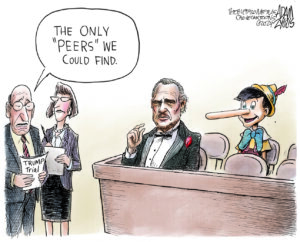
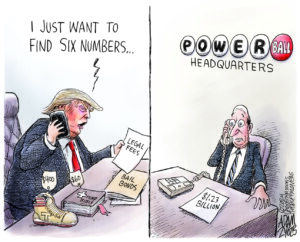

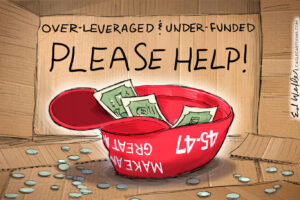
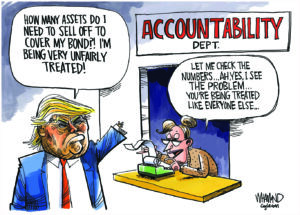

You need to be a supporter to comment.
There are currently no responses to this article.
Be the first to respond.